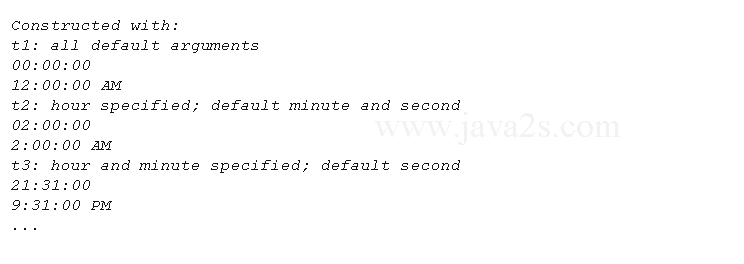Class declaration with overloaded constructors - Java Object Oriented Design
Java examples for Object Oriented Design:Constructor
Description
Class declaration with overloaded constructors
Demo Code
public class Main { public static void main(String[] args) {/*from w ww .j ava 2s. c o m*/ Time2 t1 = new Time2(); // 00:00:00 Time2 t2 = new Time2(2); // 02:00:00 Time2 t3 = new Time2(21, 31); // 21:31:00 Time2 t4 = new Time2(12, 25, 42); // 12:25:42 Time2 t5 = new Time2(t4); // 12:25:42 System.out.println("Constructed with:"); displayTime("t1: all default arguments", t1); displayTime("t2: hour specified; default minute and second", t2); displayTime("t3: hour and minute specified; default second", t3); displayTime("t4: hour, minute and second specified", t4); displayTime("t5: Time2 object t4 specified", t5); // attempt to initialize t6 with invalid values try { Time2 t6 = new Time2(27, 74, 99); // invalid values } catch (IllegalArgumentException e) { System.out.printf("%nException while initializing t6: %s%n", e.getMessage()); } } // displays a Time2 object in 24-hour and 12-hour formats private static void displayTime(String header, Time2 t) { System.out.printf("%s%n %s%n %s%n", header, t.toUniversalString(), t.toString()); } } class Time2 { private int hour; // 0 - 23 private int minute; // 0 - 59 private int second; // 0 - 59 // Time2 no-argument constructor: // initializes each instance variable to zero public Time2() { this(0, 0, 0); // invoke constructor with three arguments } // Time2 constructor: hour supplied, minute and second defaulted to 0 public Time2(int hour) { this(hour, 0, 0); // invoke constructor with three arguments } // Time2 constructor: hour and minute supplied, second defaulted to 0 public Time2(int hour, int minute) { this(hour, minute, 0); // invoke constructor with three arguments } // Time2 constructor: hour, minute and second supplied public Time2(int hour, int minute, int second) { if (hour < 0 || hour >= 24) throw new IllegalArgumentException("hour must be 0-23"); if (minute < 0 || minute >= 60) throw new IllegalArgumentException("minute must be 0-59"); if (second < 0 || second >= 60) throw new IllegalArgumentException("second must be 0-59"); this.hour = hour; this.minute = minute; this.second = second; } // Time2 constructor: another Time2 object supplied public Time2(Time2 time) { // invoke constructor with three arguments this(time.getHour(), time.getMinute(), time.getSecond()); } public void setTime(int hour, int minute, int second) { if (hour < 0 || hour >= 24) throw new IllegalArgumentException("hour must be 0-23"); if (minute < 0 || minute >= 60) throw new IllegalArgumentException("minute must be 0-59"); if (second < 0 || second >= 60) throw new IllegalArgumentException("second must be 0-59"); this.hour = hour; this.minute = minute; this.second = second; } // validate and set hour public void setHour(int hour) { if (hour < 0 || hour >= 24) throw new IllegalArgumentException("hour must be 0-23"); this.hour = hour; } // validate and set minute public void setMinute(int minute) { if (minute < 0 || minute >= 60) throw new IllegalArgumentException("minute must be 0-59"); this.minute = minute; } // validate and set second public void setSecond(int second) { if (second < 0 || second >= 60) throw new IllegalArgumentException("second must be 0-59"); this.second = second; } // Get Methods // get hour value public int getHour() { return hour; } // get minute value public int getMinute() { return minute; } // get second value public int getSecond() { return second; } // convert to String in universal-time format (HH:MM:SS) public String toUniversalString() { return String.format( "%02d:%02d:%02d", getHour(), getMinute(), getSecond()); } // convert to String in standard-time format (H:MM:SS AM or PM) public String toString() { return String.format("%d:%02d:%02d %s", ((getHour() == 0 || getHour() == 12) ? 12 : getHour() % 12), getMinute(), getSecond(), (getHour() < 12 ? "AM" : "PM")); } }
Result

Related Tutorials
- Constructors for all Ancestors Are Called When an Object of a Class Is Created Starting at the Top of the Class Hierarchy and Going Down
- Calls the Constructor of the base Class Explicitly
- Using the Account constructor to initialize the name instance variable at the time each Account object is created.
- Calling Another Constructor with this keyword
- Overloading Constructors